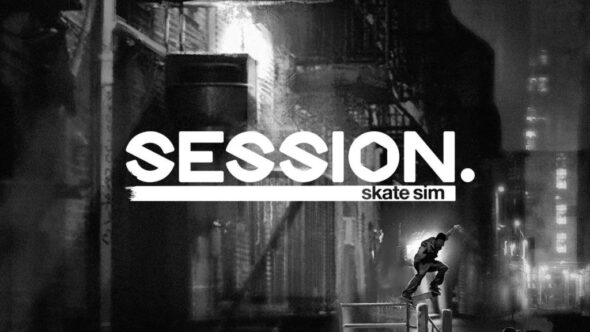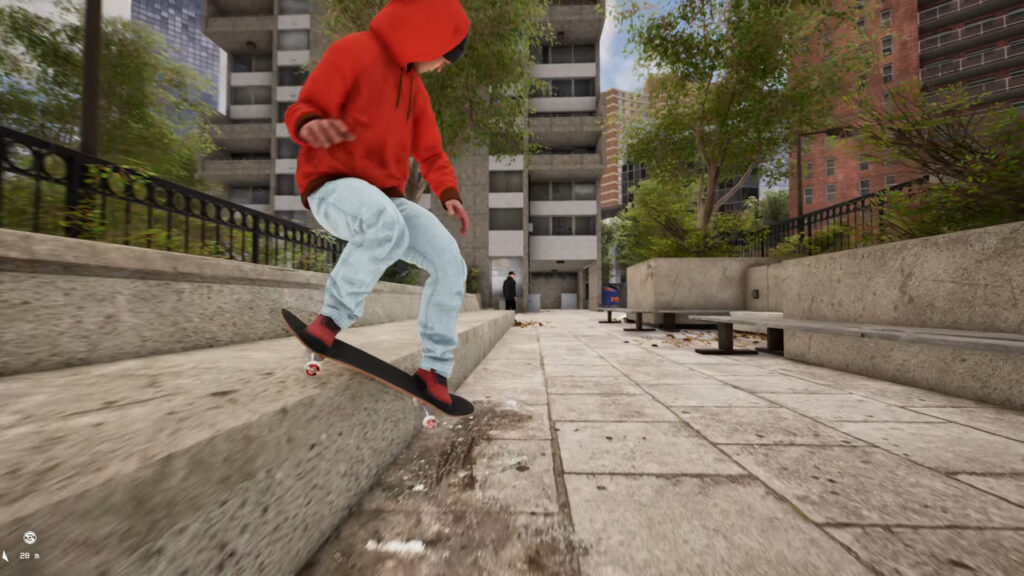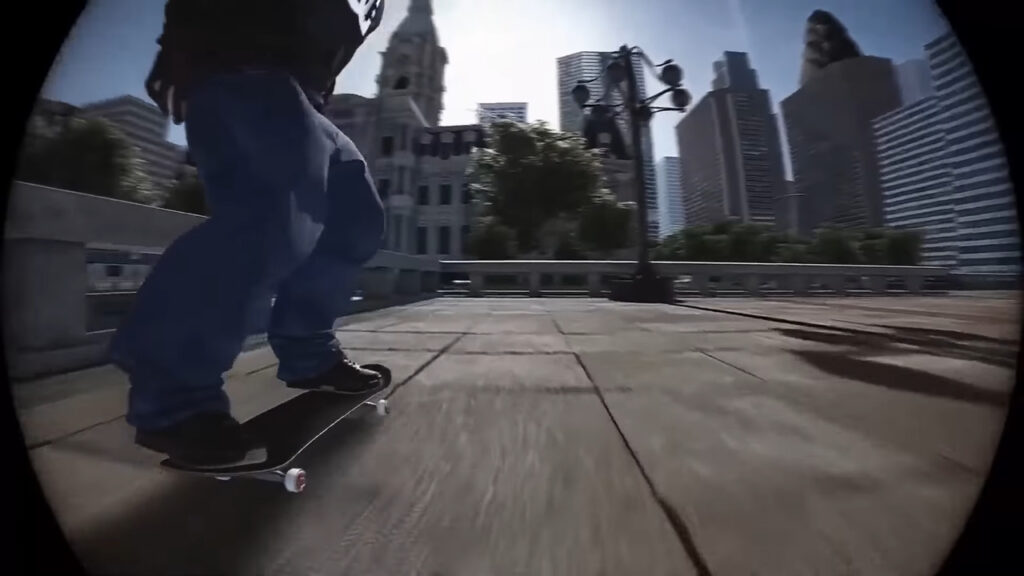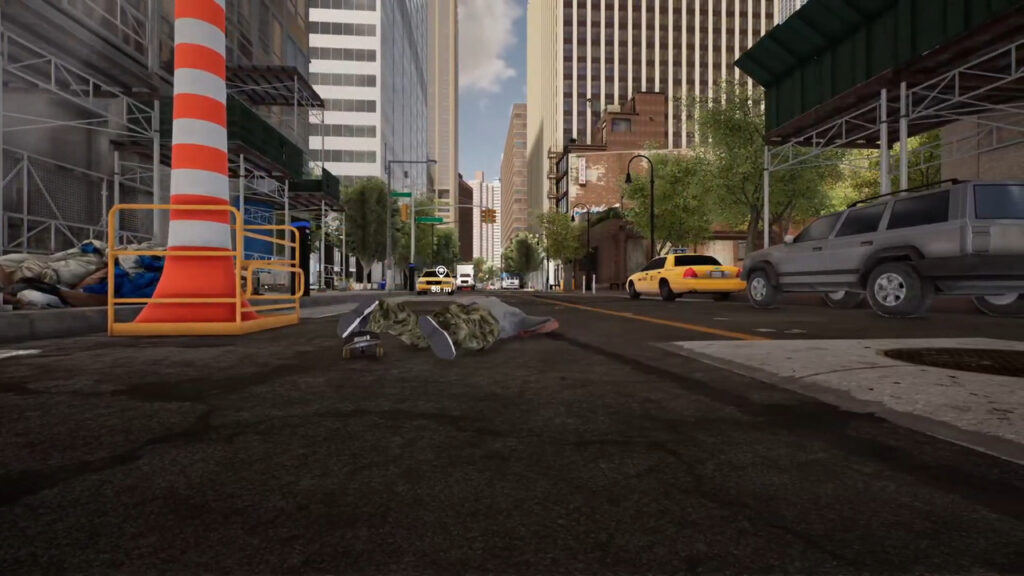
Developer: Crea-Ture Studios
Publisher: NACON
Platform: PC, PS4, PS5, Switch, Xbox One, Xbox Series X|S
Tested on: PC
Session. Skate Sim – Review
Back in the late ‘90s and early 2000s, skate games were at the peak of their popularity, with the Tony Hawk titles in particular being considered essential additions to any gamer’s library, whether they actually liked skateboarding or not. While skate games have become more of a niche since, there is still the occasional heavy hitter being released these days, like Skater XL or OlliOlli World. The latest offering for skateboard enthusiasts is the highly anticipated Session. Skate Sim, a game that has been in development since 2017. Promising an unprecedented degree of realism, is this the one skate game that ollies over the competition, or does it fall flat on its face?
Story
Because Session is a sim game at its core -it’s in the title- we weren’t expecting a lot in the way of a story, so we have to admit we were pleasantly surprised by the clever writing. Instead of the usual “rookie climbs to the top” premise that we’ve seen in other sim titles (even in Model Builder or Dinosaur Fossil Hunter), players step into the shoes -or should we say onto the skateboard?- of a highly respected veteran skater. Through the in-game dialogue text, we learn that our protagonist suffered an injury a decade ago but is now returning to the sport. It’s an interesting shakeup that explains both why the main character is picking up tricks at this pace and why he’s already familiar with some of the basics of skating that a rookie wouldn’t know yet.
Graphics
Whether it’s the obligatory fish-eye lens in photo mode or the retro interface -which is only visible when necessary-, Session definitely nails the aesthetic of the skateboarding community back in the early 2000s. The art direction is great and the environments are well designed, but overall, the visual presentation does feel rather uneven. This is mainly due to the fact that the PS3-era character models feel unfinished, with wonky faces, but other aspects also highlight that the game could have used a bit more visual polish. For one thing, despite the well-designed layouts of the environments, they feel empty, because they are only populated by static NPCs that hand out missions, and there aren’t even any vehicles present in the streets. There is an experimental mode that generates pedestrian NPCs, though you need to dig deep into Session’s menu to turn this option on, and NPCs that are actually skating aren’t present in the game at all. Objects that seem like they should be interactable, like cardboard boxes and shopping carts are static affairs. On the upside, the game has an impressive array of editing options to make your in-game replay “videos” look like those actual skate videos that people would flock to in the early days of the internet.
Sound
The lo-fi soundtrack and realistic sound effects are a highlight of the overall Session experience. While the music doesn’t really reach the same level of memorableness as some of those old-school skate titles, we still enjoyed listening to the tunes as we struggled with mastering the game’s controls. If you’re looking to find out the bands and track titles, the game has you covered too as that info pops up in the screen corner whenever a new track starts playing.
Gameplay
We should start by saying that there are two areas where Session excels: it offers an unprecedented degree of realism and it’s an incredibly challenging game. Both of these are by design: developer Crea-ture Studios describes Session as a hard game that will test your patience. We went in expecting a fresh take on the skate games of two decades ago. What we got, however, was a mindblowing amount of character control, allowing the most precise movements of video game feet that we’ve seen in any game, ever. This isn’t just a run-of-the-mill skate game: it’s an incredibly realistic simulator that’s probably the most accurate way to land tricks outside of strapping on a pair of skates yourself and getting out there. It does have its flaws, and we’ll get to those, but the core experience is impressive. The game’s mission-based structure is designed to gradually get the player to perform more difficult tricks through precise timing and increasingly more complicated button combinations. In real life, being proficient at skateboarding relies on muscle memory, of course, and Session’s degree of accuracy actually requires you to build up muscle memory with your fingers as well.
That degree of accuracy does come with a plethora of downsides, however. Getting to grips with Session isn’t easy in any way, shape, or form. You’ll need to master not only one control stick for each foot, but buttons and triggers as well if you’re going to simply move your character around, let alone perform tricks. If you’re planning on playing on PC, then we should warn you at this point that a controller is a must, as the game simply cannot be played with a mouse and keyboard. Familiarizing yourself with the controls can be a lot to wrap your head around, and there is a good chance that it will take you more than an hour before you’re even able to perform the most basic movements. Session is a title that requires commitment and is a game that starts to drag before it even properly starts. If you’re obsessed with skating in real life, you’re probably going to love how realistic everything is but for a mainstream audience, getting to grips with the game can be a tougher pill to swallow. The game would have probably benefited from having either better assistance for newcomers or the tutorial simply explaining more than the basics, but we’re under the impression that Crea-Ture Studios had a specific audience in mind, instead of wanting to cater to the masses. We should point out that Session still has an “easy” mode but even with that turned on, the game felt needlessly frustrating and we’d recommend manually making adjustments to the game’s control settings to make the experience less frustrating.
There are more issues with Session beyond the initial difficulty curve too. During our time with the game, we encountered a handful of minor bugs, such as tricks not registering on the objective list when performing them and even poor collision detection. We expect the more egregious issues to be patched out eventually, but in its current state, Session feels like an unfinished beta version rather than a full release. It’s a technically impressive demonstration of Crea-Ture’s potential, despite the bugs, but that’s where the appeal ends: the uneven visuals and difficulty curve only highlight the fact that Session is sorely lacking the fun factor that drives players to play a game in the first place. Session feels like a clinical and by-the-numbers experience, and it lacks the charm that made those skate games from two decades ago so memorable.
Conclusion
Session was always going to be a title with limited appeal for a mainstream audience, as is often the case with sim games. Diehard fans of skateboarding will find plenty to like here from a technical perspective, but a handful of glitches and underwhelming visuals drag down the overall experience. The game’s difficult learning curve and lack of accessibility options hammer the point even further home that this is a niche title. Hopefully future patches will resolve the glitches and improve the graphics but even with more polish, there’s not a lot of fun to be found here. If you happen to fall into Session‘s specific niche, you can probably bump up the score up by a point -just keep in mind that in its current state, the game still feels like an Early Access title rather than a full release.









No Comments